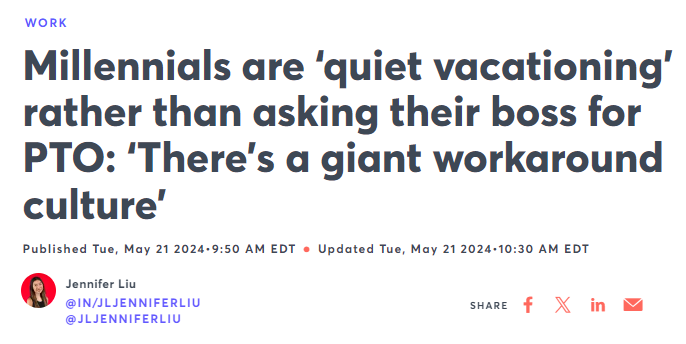A few weeks ago, my spouse said to me, “I thought weekends were for rest? There’s no rest. There’s just chores.”
His words are the reality of most people, especially people with kids or other caretaking responsibilities. On weekends, we clean the house, take care of the yard, pay bills, and do other things that keep things running. We also spend time with our kids, since the week is filled with school, homework, and extracurriculars.
It leaves very little time to just be. We need time when nothing is required of us and we can do things we simply enjoy and don’t fill some work or life obligation.
We can’t take the time we need
I wrote about dystopian headlines last week, and another one caught my attention this week — this one from CNBC.
My immediate thought was that this is another example of productivity panic: bosses have come up with a new thing to worry about. Quiet vacationing: add it to the things of things workers do to avoid being their Fully Productive Selves, including quiet quitting and having side hustles.
The article explains that Millennials don’t take all of their PTO because they feel they can’t: they face too many pressures at work to meet deadlines. Instead, they take time off without communicating it to their manager.
My immediate thought was a scoff. If this “quiet vacationing” is happening in stealth mode, most people likely can’t escape for more than a few hours without being noticed. Hardly a vacation. The article implies that people schedule-send messages or move their mouse to give the impression that they’re working, but we’re still not talking about an actual break.
As I was preparing to write this article, I saw someone on Threads comment that she asked her employer for unpaid leave, because she was so stressed. Her employer denied her request. So she quit.
A friend of mine submitted a request to his employer to use his PTO. His request was denied because the employer couldn’t figure out coverage for his role. To be clear: PTO is part of a compensation package, so he was effectively being denied some of his compensation.
No wonder workers feel like they can’t take a break and have to “quiet vacation” instead. Employers deny requests right and left. Even though studies have shown that taking vacation has positive benefits, not only for the employee but for overall work productivity.
For a long time, I worked for a company with no set working hours. If I didn’t want to work for half a day or even a whole day, I didn’t have to ask permission. I just didn’t work. As long as my deadlines were met, the day-to-day didn’t matter. The company had a general rule of thumb that if someone planned to be gone for more than 24 hours to let other people know, but it still wasn’t asking for permission. Simply being courteous.
My subsequent job was fully remote and my work never took an entire 8-hour day. I was surprised when my manager would send me messages that he was going to “step away” for an hour. The company was global and with people working across multiple time zones, I never thought about other people’s working habits or hours. But apparently, there was a company-wide perception that during your designated working hours, you were working.
My subsequent employer was even worse, with most people working synchronously. I felt like I couldn’t step away, even for a short period of time.
I applaud the Millennials who are “quiet vacationing”—even if it’s half a day or however much we’re able to manage. The way we work is incompatible with life. As my spouse pointed out, otherwise, there’s no rest.
We need a day of rest
I got my first taste of a four-day workweek at my last employer. Even though the work was mostly synchronous, no one worked on Fridays. It was glorious. It was an entire day to myself. My kids would be in school. My spouse works from home, but he’d still be working. I’d go to yoga class. Go grocery shopping, which gave me more freedom on the weekends. Take a nice, long nap and generally do nothing in the afternoons.
Vacations and mini-breaks are all amazing, but there’s something uniquely beneficial about collective time off. In a four-day workweek, I wasn’t missing anything because the entire company wasn’t working.
Sixty-one companies in the U.K. participated in a pilot program to move to a 4-day workweek with no reduction in pay. The results found that employees were more motivated, reported higher job satisfaction, and had improved physical and mental health. Absences related to illnesses fell. Social media management tool Buffer has been working a 4-day workweek for years. In an article, the company wrote:
The reduced schedule allows employees to focus on personal interests, hobbies, and self-care during their extra day off. Life admin is better handled during a four-day workweek — people have more time for their families and friends.
Many people acknowledge that something needs to change. The U.S. even introduced a bill to shorten the standard workweek to 32 hours, though there’s been no movement since in more than a year. There’s also talk that automation and AI can make people more efficient at their jobs. Certainly, that would make room for a shorter workweek, but I’d bet a lot of money that instead, employers will use the newly uncovered “free time” for more work.
Author and writing coach Jen Louden wrote on Threads: “It strikes me that we are all so very exhausted.” My response was that not only are we more exhausted, but we are more aware of how exhausted we are.
For me, personally, that started during the pandemic. I collapsed into my own exhaustion and it’s been hard to recover. So many things about work and life don’t work. They’re opposing forces, and people are suffering as a result.
It’s one of the reasons I went out on my own. I wanted full control over my time. Though I’d be remiss if I didn’t mention how utterly exhausted I am right now. I think it’s the after-effects of a large (and stressful) home improvement. But I can’t rule out that running a business is draining, because I think about my business all the time.
No matter the work — whether for an employer or on our own — we need to find ways to take a REAL break.
Most issues of this publication are free because I love sharing ideas and connecting with others about the future of work. If you want to support me as a writer, you can buy me a coffee.
If you love this newsletter and look forward to reading it every week, please consider forwarding it to a friend or becoming a subscriber.
Have a work story you’d like to share? Please reach out using this form. I can retell your story while protecting your identity, share a guest post, or conduct an interview.








Being reluctant, or even afraid, to ask for a break is a good sign that our careers are headed in the wrong direction. I've always appreciated unconventional schedules with fewer requirements to be somewhere for a set amount of time. Maybe some people do better with structure, but mostly it seems to constrict rather than promote anyone to be their best.